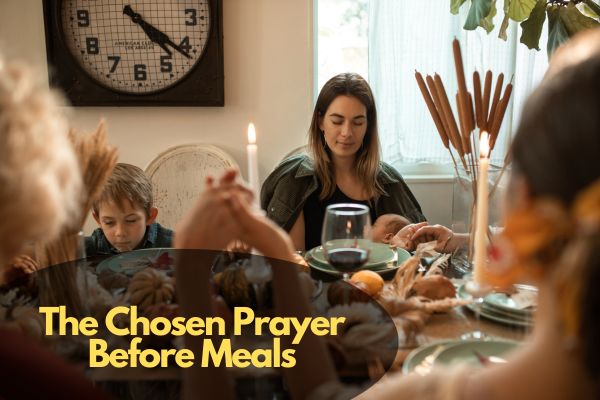The custom of saying prayers before meals is a long-standing tradition that promotes togetherness among people of different backgrounds and faiths. This practice, which is firmly embedded in the fabric of the human experience, endures with unwavering significance despite changes in social movements and the unstoppable passage of time.
Historical Context:
The custom of praying before meals has a long history, spanning from ancient cultures to medieval communities. Offerings to the gods preceded many community meals in ancient Greece, serving as a model for modern grace. During the Middle Ages, extravagant feasts became popular, and prayers served as both a show of social order and a statement of thanks.
The Chosen Prayer Before Meals
The prayers said at mealtimes are a complex web of many customs, meanings, and purposes. This small gesture has profound significance that transcends all nations and religions and links us to the divine, our community, and the very source of our nourishment. Now let’s explore some of the most popular kinds of prayers spoken during meals:
Traditional Grace
“For the food before us we give thanks, O Lord, and for Thy bounty that fills our hearts. Amen.” This simple and widely recognized prayer expresses gratitude for the food at hand and God’s generosity.
Thanksgiving Blessing
“Heavenly Father, we thank you for this meal and the hands that prepared it. We thank you for the sun that shone and the rain that fell, for the earth that yielded and the hands that harvested. We thank you for the blessings of family and friends gathered around this table. Bless this food and nourish our bodies, and may our hearts be filled with gratitude for all your gifts. Amen.” This more elaborate prayer offers specific thanks for various aspects of the meal and the blessings of community.
Silent Gratitude
Many Christians choose to offer a silent prayer of gratitude before a meal. This allows for personal reflection and a heartfelt expression of thanks for the nourishment about to be received.
Prayer for Sharing
“Lord, as we gather around this table, we pray for blessings not only for ourselves but also for those in need. May this meal be a reminder of your love and generosity, and may we be inspired to share our blessings with others. Amen.” This prayer acknowledges the wider context of hunger and injustice while expressing a commitment to sharing God’s bounty.
Blessings for Growth
“God of all creation, we thank you for this food that sustains us. May it nourish our bodies and minds, and grant us the strength and wisdom to grow in your love and service. Amen.” This prayer focuses on the connection between physical nourishment and spiritual growth, seeking God’s blessing for a deeper walk in faith.
General Prayer Before Meal
- Bless, O Lord, This food to our use
And us to thy service,
And keep us ever mindful
Of the needs of others.
In Jesus’ Name, Amen. - Lord, bless this food and grant that we
May thankful for thy mercies be;
Teach us to know by whom we’re fed;
Bless us with Christ, the living bread.Lord, make us thankful for our food,
Bless us with faith in Jesus’ blood;
With bread of life our souls supply,
That we may live with Christ on high.
Amen. - In a world where so many are hungry,
May we eat this food with humble hearts;
In a world where so many are lonely,
May we share this friendship with joyful hearts.
Amen. - We look to you, O Lord,
for food to nourish our bodies,
for grace to strengthen our spirits,
for love to enrich our life;
through Jesus Christ our Lord. Amen. - Father God, may this food give strength to our bones and restore our energy as your Word gives strength to our souls. May what we drink replenish our dry bones as your promises refresh our minds. May this food make us healthy and strong. Amen.
Conclusion
The chosen prayer said before meals becomes a light of thankfulness in the midst of our busy lives, tying us to a universal human experience that cuts over social, religious, and cultural divides. The evolution of this practice is visible to us through the lens of history, a continuous thread woven across the fabric of many civilizations.
The practice of expressing appreciation before meals has proven to be enduring, as seen by anything from the ornate feasts of medieval societies to the straightforward, sincere prayers of today. It finds a place in both secular musings and religious rites as it adjusts to the changing times. The cultural variations remind us that, regardless of our heritage, the universal act of expressing thanks connects us in a moment of shared humanity.




